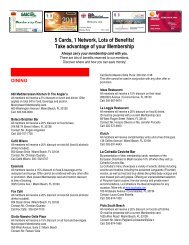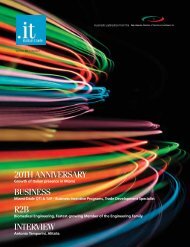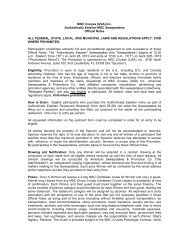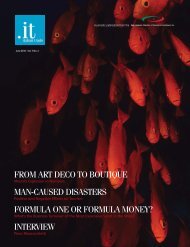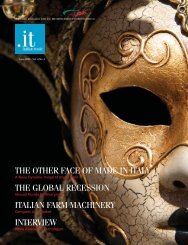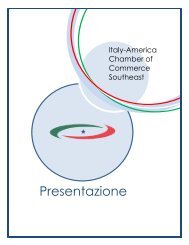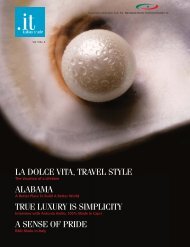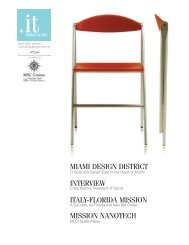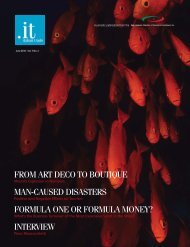italian fashion defines luxury - Italy-America Chamber of Commerce ...
italian fashion defines luxury - Italy-America Chamber of Commerce ...
italian fashion defines luxury - Italy-America Chamber of Commerce ...
You also want an ePaper? Increase the reach of your titles
YUMPU automatically turns print PDFs into web optimized ePapers that Google loves.
BUSINESS<br />
Look Before You Leap<br />
FIRPTA<br />
While not a tax itself, the U.S. law, Foreign Investment in Real Property Tax Act<br />
(FIRPTA), imposes additional withholding and reporting obligations on non-<br />
U.S. owners <strong>of</strong> U.S. real estate. FIRPTA can be cumbersome and expensive<br />
to comply with. FIRPTA was passed by the U.S. Congress in 1980 back when<br />
Congress was concerned that rich foreigners -- from countries such as Japan<br />
or Saudi Arabia -- were selling property here in the United States, and not<br />
paying the appropriate capital gains tax. FIRPTA imposes a 10% withholding<br />
on the selling price <strong>of</strong> a U.S. property owned by a foreigner. Therefore, the<br />
non-US owner <strong>of</strong> a U.S. real property who sells a property for $1,000,000<br />
would have $100,000 <strong>of</strong> the sale proceeds withheld (i.e. the funds would<br />
be held by the U.S. tax authority until the final determination <strong>of</strong> the amount<br />
<strong>of</strong> taxes due on the property). In addition, withholding can apply when a<br />
foreigner receives rental income from leasing their U.S. real property.<br />
Yet all <strong>of</strong> these taxes and requirements can be avoided or minimized by<br />
careful structuring <strong>of</strong> the transaction.<br />
Common Strategies for Foreign Owners<br />
One common and reliable technique to avoid U.S. estate tax liability is to form<br />
a foreign corporation with which to acquire the property. Where the foreign<br />
person owns the shares <strong>of</strong> the foreign corporation which in turn owns the<br />
U.S. property, U.S. estate tax would not apply as the foreign shares are not<br />
considered U.S. property. Typically, the foreign corporation is formed in a<br />
“tax-friendly” jurisdiction such as the British Virgin Islands, Cayman Islands,<br />
or Panama. Selection <strong>of</strong> the jurisdiction should be done in collaboration with<br />
the investor’s tax advisor in his/her native country.<br />
Uniti non sará applicabile dal momento che le azioni di una societá<br />
straniera non sono considerate proprietá statunitense. In genere, la<br />
societá estera é costituita in luoghi che hanno un ordinamento fiscale<br />
piú concessivo, come le Isole Vergini Britanniche, le Isole Cayman o<br />
Panama. La selezione della giurisdizione piú adeguata dovrebbe<br />
esser fatta dell’investitore in collaborazione con quello che é il suo<br />
commercialista nel proprio Paese d’origine.<br />
Non avendo sede negli USA, tuttavia, le societá straniere continuano<br />
ad incorrere nella FIRTPA. Inoltre, gli Stati Uniti impongono<br />
un’addizionale “tassa sui pr<strong>of</strong>itti di ramo d’azienda”, dovuta quando<br />
una proprietá é posseduta in maniera diretta dalla societá straniera.<br />
Per aggirare questa tassa e la FIRPTA, la proprietá dovrebbe essere<br />
posseduta da una societá statunitense, a sua volta posseduta da una<br />
societá estera. Sfortunatamente, questo fa’ sí che l’utile netto sia<br />
soggetto all’apposita tassa statunitense sulle societá (in luogo di quella<br />
sui pr<strong>of</strong>itti di ramo d’azienda), ma anche in questo caso é possibile<br />
trovare con il proprio commercialista delle strategie da adottare per<br />
minimizzare l’effetto di tale tassa. Il commercialista puó prendere<br />
in considerazione altre strategie, come l’acquisto di una polizza<br />
assicurativa sulla vita o mettere la proprietá in un fondo fiduciario<br />
irrevocabile, in modo da minimizzare o quanto meno mitigare l’effetto<br />
della tassa di successione.<br />
Un <strong>italian</strong>o non residente negli Stati Uniti che investe in immobili<br />
negli USA, in altre parole, puó essere soggetto a delle significative<br />
conseguenze fiscali se non pianifica adeguatamente il proprio<br />
investimento in anticipo. Proprio come un investitore si affida al suo<br />
broker per far fruttare al meglio il proprio denaro nell’acquisto di<br />
immobili USA, un legale o un commercialista puó minimizzare tasse<br />
e trattenunte e fare in modo di massimizzare il valore che rimane in<br />
tasca all’investitore.<br />
Because they are not based in the U.S., foreign corporations are still subject<br />
to FIRPTA. Also, the U.S. imposes a separate “branch pr<strong>of</strong>its tax” that would<br />
be due if the property is owned directly by such foreign corporation. To avoid<br />
this tax and the application <strong>of</strong> FIRPTA, the property may be owned by a U.S.<br />
company, which is in turn owned by the foreign corporation. Unfortunately,<br />
this subjects the net income to U.S. corporate taxation (in lieu <strong>of</strong> the branch<br />
pr<strong>of</strong>its tax), but strategies can be employed by your tax advisor to minimize<br />
the effect <strong>of</strong> such taxes. Your tax advisor can discuss other strategies like<br />
purchasing life-insurance policy or placing the property into an irrevocable<br />
trust, to minimize or mitigate the effect <strong>of</strong> the U.S. estate tax.<br />
A non-U.S. resident Italian who invests in U.S. real estate may face significant<br />
tax consequences if the investment is not planned for properly in advance.<br />
Just as an investor relies on a broker to obtain the best value for their money<br />
when purchasing U.S. real property, an attorney or tax advisor can minimize<br />
the investor’s taxation and withholding costs to ensure that as much value as<br />
possible stays with the investor.<br />
.18



